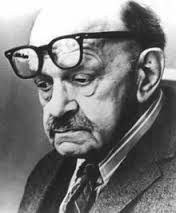One of the composers to which I always return for insight is Roger Sessions. I always seem to agree with his thoughts about everything. I was re-reading an interview that Edward T. Cone did with his former teacher and came across this lovely bit.
“The danger I see today among some young composers is that they learn to write one piece and keep on essentially writing one piece all their lives. They learn certain clichés and formulas; and if they ever had the independence and the imagination to want to do something else, they couldn’t.”
It is a problem that Jake Runestad and I discussed over coffee a few months ago. I don’t even think it’s always a question of technique. There are tremendous market pressures on all creative types now. If you do something that is successful – to whatever degree – you will receive incentives to create sequels. It’s the Vivalidification of the compositional world. So, some composers choose to stop exploring.
In some ways, I’m glad to be of a certain age. When I was coming up, we were all still writing 12 tone music and free atonal works. To come out of that and still have it as a resource is a great gift. The down side is that if you make the choice to explore instead of regurgitate, you wind up becoming less recognizable. You become the Miles Davis who was playing rock when so many of his fans wanted him to put in the Harmon and play ballads. In any case, I’m sticking with T.S. Eliot, and “shall not cease from exploration.”
I’ll leave all you theorists with one more quote from Sessions in case you ever need to find the adverbial form of “Schenker” for your papers.
“I think what brought him and Schenker together was a general antagonism to contemporary art; but he persuaded me that there was something to be learned from Schenker, and I still think there is, provided one doesn’t go the whole hog, Schenkeristically speaking.”

Dear Kurt,
Great blog! Sessions is highly quotable. If you want to read more interviews with him, you can download my "Conversations with Roger Sessions" from Amazon.com or Smashwords.com. (I have also written three other books about RS; see my Amazon author page.)
Andrea Olmstead
Oh my! Is this THE Andrea Olmstead?! I've read all of your books! So, I was a composition student of Robert Helps, and he was the one who turned me on to Sessions. I actually wrote a paper on Sessions that I've always wanted an expert to look at. It's an argument that Sessions aesthetic position was influenced and borrowed language from Martin Buber and some of the existentialist philosophers.